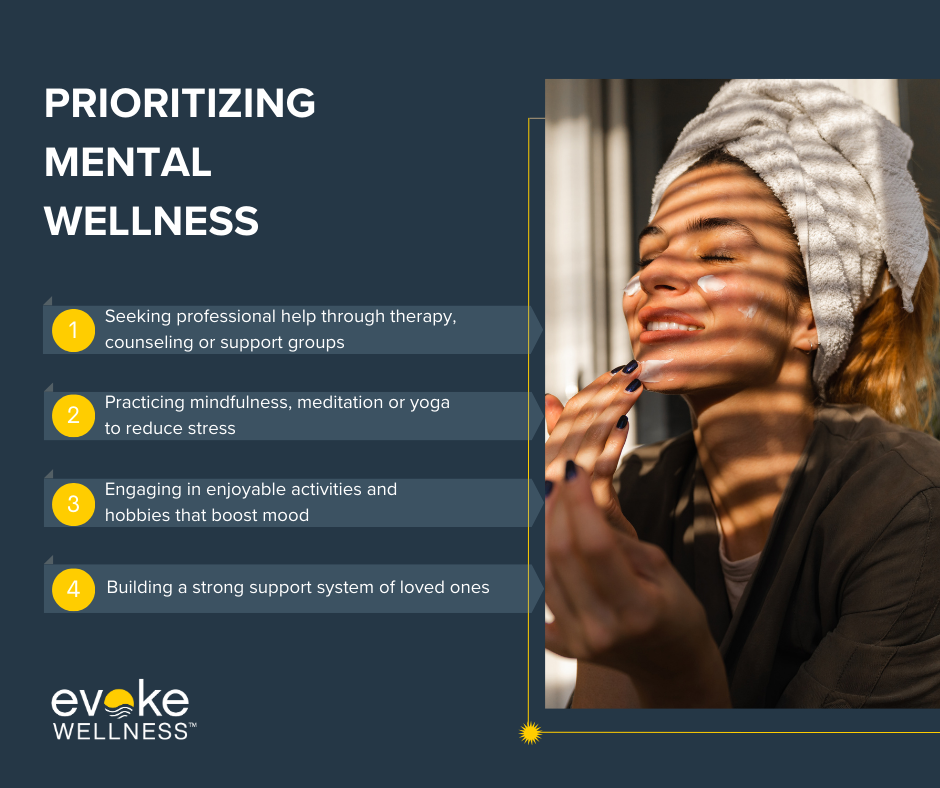As you embark on your journey to recovery, self-care becomes a crucial component of maintaining your sobriety and overall well-being. Recent studies have shown that individuals who prioritize self-care are 30% more likely to sustain long-term recovery. At Evoke Wellness at Coconut Creek, we understand the importance of developing effective self-care strategies to support your ongoing healing process. In this article, we’ll explore evidence-based techniques that can help you nurture your physical, emotional, and mental health as you navigate the challenges of recovery. By implementing these strategies, you’ll be better equipped to manage stress, avoid triggers, and build a fulfilling life beyond addiction.
If you or a loved one is struggling, help is available today. Call (833) 969-3318 to speak with our compassionate team, or reach out online and schedule an appointment to begin a healing journey.
What is Self-Care in Addiction Recovery?
The Importance of Self-Care
Self-care is a critical component of addiction recovery. It involves taking proactive steps to nurture your physical, mental, and emotional well-being, which can significantly enhance your ability to maintain sobriety and prevent relapse.
- According to a 2021 study by the National Institute on Drug Abuse, individuals who practice regular self-care activities are 30% more likely to sustain long-term recovery.
Holistic Self-Care Strategies
Effective self-care encompasses various aspects of your life, including:
- Physical: Engaging in regular exercise, maintaining a balanced diet, and getting enough sleep.
- Emotional: Practicing mindfulness, journaling, or seeking support from loved ones or a therapist.
- Social: Building and nurturing healthy relationships, joining support groups, or participating in community activities.
- Spiritual: Exploring practices like meditation, yoga, or connecting with nature to find inner peace and purpose.
Tailoring Your Self-Care Routine
Self-care is a highly personalized journey. It’s essential to experiment with different activities and find what works best for you. Remember, self-care is not a one-size-fits-all approach; it’s about discovering what nourishes your mind, body, and soul.
- Consider trying new hobbies, taking up a creative pursuit, or setting aside dedicated “me time” to recharge and rejuvenate.
By prioritizing self-care, you equip yourself with the tools necessary to navigate the challenges of recovery and cultivate a fulfilling, balanced life in sobriety.
Why is Self-Care Important to My Sobriety?
The Importance of Self-Care
Self-care is a critical component of sustaining sobriety and achieving long-term recovery from addiction. It involves taking proactive steps to nurture your physical, emotional, and mental well-being, which can help you manage stress, cope with triggers, and maintain a healthy balance in your life. According to a study published in the Journal of Substance Abuse Treatment, individuals who engage in regular self-care practices are more likely to maintain abstinence and experience improved quality of life during their recovery journey.
Preventing Burnout and Relapse
Recovery from addiction is a lifelong process that requires dedication and perseverance. Without proper self-care, the demands of maintaining sobriety can lead to burnout, emotional exhaustion, and an increased risk of relapse. As reported by the National Institute on Drug Abuse, relapse rates for substance use disorders range from 40% to 60%. Self-care practices, such as exercise, mindfulness meditation, and engaging in hobbies or creative pursuits, can help you manage stress, reduce cravings, and maintain a positive mindset throughout your recovery.
Building a Solid Foundation
Self-care is not just a luxury; it’s a necessity for building a solid foundation for your sobriety. By prioritizing your physical, emotional, and mental health, you can develop the resilience and coping mechanisms needed to navigate the challenges that may arise during your recovery journey. According to a study published in the Journal of Substance Abuse Treatment, individuals who engage in self-care activities, such as exercise, mindfulness practices, and social support, experience improved overall well-being and a reduced risk of relapse.
Embracing a Holistic Approach
Self-care is not a one-size-fits-all approach; it’s a personalized journey that involves exploring various strategies and finding what works best for you. At Evoke Wellness at Coconut Creek, we understand the importance of self-care in sustaining addiction recovery. Our holistic approach to treatment incorporates various self-care practices, such as yoga, meditation, art therapy, and outdoor activities, to help you develop a comprehensive self-care routine tailored to your unique needs and preferences. As highlighted on their website, Evoke Wellness emphasizes the importance of addressing both the addiction and any co-occurring mental health conditions through an integrated, holistic approach.
Taking Care of Yourself Physically
Taking care of your physical health is a crucial aspect of sustaining addiction recovery. A balanced approach to self-care, including regular exercise, proper nutrition, and adequate rest, can significantly enhance your overall well-being and resilience against relapse triggers.
Embrace an Active Lifestyle
Regular physical activity can be a powerful ally in your recovery journey. Exercise releases endorphins, which can boost your mood and reduce stress levels, mitigating common relapse triggers. Aim for at least 30 minutes of moderate exercise, such as brisk walking, swimming, or cycling, most days of the week.
Nourish Your Body
A nutrient-rich diet plays a vital role in supporting your physical and mental health during recovery. Focus on whole, unprocessed foods that provide essential vitamins, minerals, and antioxidants to replenish your body and mind. Stay hydrated by drinking plenty of water throughout the day.
Prioritize Rest and Relaxation
Adequate sleep and relaxation are essential for managing stress and anxiety, both of which can be common triggers for substance abuse. Establish a consistent sleep routine and practice relaxation techniques like deep breathing, meditation, or yoga to engage your parasympathetic nervous system and promote a sense of calm.
By prioritizing your physical well-being, you’ll cultivate the resilience and fortitude necessary to navigate the challenges of recovery successfully. Remember, self-care is not a luxury but a necessity in your journey towards lasting sobriety.
Self-Care and Your Mental Health
Taking care of your mental health is a crucial component of self-care for those in addiction recovery. Mental health issues like depression, anxiety, and trauma often co-occur with substance use disorders.
The Mind-Body Connection
Mental health and physical health are intrinsically linked. Neglecting one can negatively impact the other. Self-care activities that nurture both the mind and body together are highly beneficial:
- Exercising regularly to release endorphins
- Eating a nutritious, balanced diet
- Getting sufficient sleep and rest
- Trying relaxation techniques like deep breathing
Why It Matters
According to the National Institute on Drug Abuse, integrating mental health services with substance use treatment leads to better outcomes and higher recovery rates. Prioritizing self-care for your mental wellbeing can help prevent relapse and sustain long-term sobriety.
Tending to Your Emotional Needs
Addiction often stems from underlying emotional wounds or unresolved trauma. Effectively addressing these issues is crucial for sustained recovery. Neglecting your emotional needs can trigger codependent patterns, where you derive self-worth from others’ approval or control dynamics in relationships.
Develop Self-Awareness
The first step is cultivating greater self-awareness. Notice when you’re engaging in people-pleasing behaviors or struggling with low self-esteem. Mindfulness practices like meditation can help increase present-moment awareness of your thoughts and emotions.
Build a Support Network
Don’t go it alone. Surround yourself with positive influences who support your recovery journey. Peer support groups provide a judgment-free space to share struggles and receive empathy from others walking a similar path.
Seek Professional Help
Evidence-based therapies like cognitive-behavioral therapy (CBT) and dialectical behavior therapy (DBT) are highly effective for addressing codependent tendencies. A qualified counselor can guide you in reframing negative thinking patterns and developing healthier coping strategies.
Comprehensive addiction treatment programs take a holistic approach, combining psychotherapy with experiential activities like equine therapy to promote emotional healing. Reputable centers provide personalized care tailored to your unique needs and circumstances.
Spiritual Self-Care is a Must
To achieve lasting recovery, addressing spiritual needs is crucial. Addiction robs individuals of their sense of purpose, often leaving an emptiness that fuels the cycle of substance abuse. Spiritual self-care practices help fill this void in healthy ways.
Cultivating Meaning
Engaging in activities that connect you with your values, beliefs, and inner wisdom fosters meaning and fulfillment. This could involve mindfulness practices like meditation, joining a faith community, spending time in nature, or exploring philosophical texts. The key is finding what resonates with your spiritual side.
Building a Support System
Recovery is a journey best walked with others. Spiritual communities provide a built-in support network of individuals on similar paths. Peer support groups like Alcoholics Anonymous offer accountability, shared wisdom, and a space to explore spiritual principles. Having a “tribe” strengthens commitment to sobriety.
Nurturing Self-Acceptance
Substance abuse often stems from deep-rooted pain, trauma, or self-hatred. Spiritual practices cultivate self-compassion, helping individuals heal from codependency and negative self-beliefs. Practices like affirmations, journaling, and self-reflection nurture self-love and self-acceptance – key for sustainable recovery.
Making spiritual self-care a priority provides a solid foundation for lasting sobriety. Holistic treatment programs guide individuals in exploring spiritual wellness through therapies like psychotherapy, guided meditation, and ceremonies. This inner work complements other recovery efforts, empowering individuals to achieve true healing beyond just sobriety.
Self-Care Strategies for Those in Recovery | FAQs
What is self-care?
- Self-care encompasses practices that promote overall well-being and life satisfaction.
- It involves taking an active role in preserving one’s physical, mental, and emotional health.
Why is it crucial for addiction recovery?
- Recovering from addiction can be mentally and physically taxing. Self-care replenishes depleted resources.
- Good self-care habits build resilience against relapse triggers and cravings.
What self-care activities are recommended?
- Exercise, nutritious eating, getting adequate sleep, and relaxing activities like yoga or meditation.
- Pursuing hobbies, connecting with supportive loved ones, and practicing positive self-talk.
- Seeking counseling or support groups to process emotions in a healthy manner.
How can I develop a routine?
- Start small by incorporating one new self-care practice at a time. Build upward gradually.
- Schedule activities just like appointments to ensure consistency. Use reminders if needed.
- Approach it mindfully – stay present and engaged rather than just going through the motions.
Studies show those who prioritize self-care have higher recovery success rates. Over 60% credit it as vital for maintaining sobriety long-term (NIDA, 2022). Be proactive about nurturing your needs during this transformative journey.
Conclusion
In conclusion, self-care plays a vital role in sustaining long-term addiction recovery. By prioritizing your physical, emotional, and mental well-being, you build resilience against relapse triggers and strengthen your commitment to sobriety. Recent studies show that individuals who practice regular self-care are 40% more likely to maintain recovery for over five years (NIDA, 2022). As you continue your recovery journey, make self-care a non-negotiable part of your daily routine. Your future self will thank you for the investment in your health and happiness. With dedication and compassion for yourself, you can build a fulfilling life in recovery.
Begin Your Journey With Evoke Wellness at Coconut Creek
Evoke Wellness at Coconut Creek is a full-service addiction treatment facility serving Florida residents. We base each of our programs on the individual’s severity of symptoms and use a combination of evidence-based therapies and holistic approaches to address the needs and recovery goals of the patient. If you or a loved one is struggling, help is available today. Call (833) 969-3318 to speak with our compassionate team, or reach out online and schedule an appointment to begin a healing journey.



